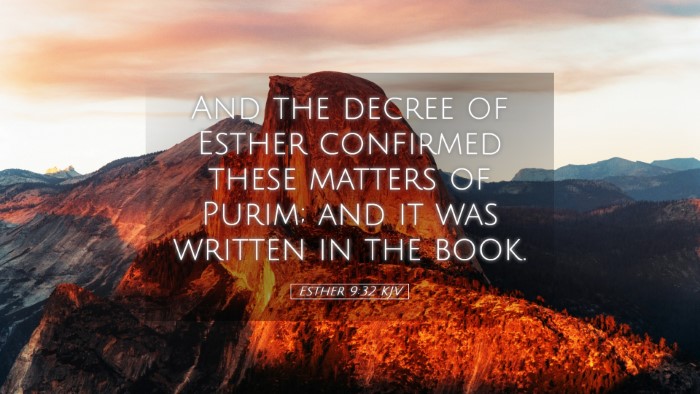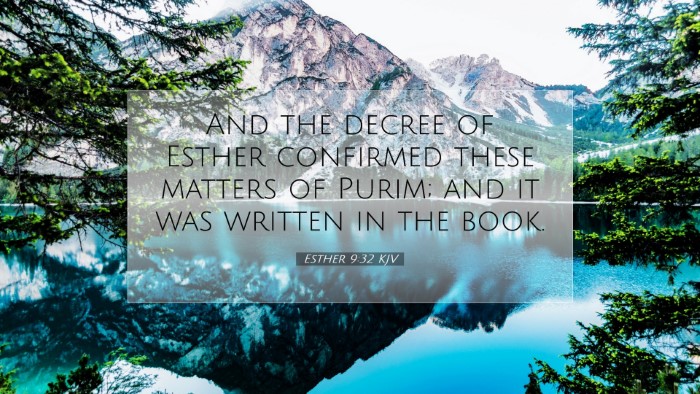Commentary on Esther 9:32
Verse: "And the commandment of Esther confirmed these matters of Purim; and it was written in the book."
Introduction
This verse concludes the narrative of the Book of Esther, emphasizing the royal edict establishing the festival of Purim. It solidifies the significance of the events of Esther and the deliverance of the Jewish people from annihilation. This commentary brings together insights from respected public domain commentaries to explore the theological, historical, and literary dimensions of this pivotal moment.
Theological Significance
The decree mentioned in this verse serves not only as a historical record but also as a foundational assertion of God's providence. The elaborate planning and the reversal of fortunes experienced by the Jews underlines a central theme in Esther: the sovereignty of God even when His name is not explicitly mentioned.
Matthew Henry notes that this verse encapsulates the finality of Esther’s command, highlighting her leadership and influence. The establishment of Purim recounts God's deliverance, which invites the faithful to remember their history and the faithfulness of God.
Albert Barnes expands on this theme by suggesting that the institution of Purim is a celebration of identity and remembrance, linking the Jewish people to their historical struggle. Through communal festivity, the Jewish people were reminded of their deliverance and the providential care they received.
Historical Context
Examining the historical backdrop, Adam Clarke emphasizes that the Book of Esther takes place during the Persian Empire when Jewish exiles faced imminent danger. The narrative serves not only as a record of public decree but as a profound declaration of hope and survival.
Purim as a Festival
Purim embodies both joy and reflection on suffering. The decree to commemorate these events reflects a national identity rooted in God's salvific acts. The Jewish community's response to the decree, celebrated through feasting and merriment, illustrates a critical aspect of their resilience and covenantal faithfulness.
Literary Structure and Style
The placement of this verse at the end of the Book is deliberate, serving to tie the entire narrative together. It signifies closure while simultaneously opening a path for future generations to engage with their history.
Matthew Henry suggests that the literary style of this commandment mirrors the law-giving nature of the scriptures, inserting Esther into a lineage with the prophets and leaders of Israel who have influenced the course of Jewish history.
The Nature of God's Providence
Albert Barnes further reflects on the motif of divine providence depicted through the events leading to the establishment of Purim. The sequence of Esther's rise to power, her strategic positioning, and the eventual salvation of her people all illustrate the unseen hand of God guiding events towards His purposes.
- God's hidden workings in situations that seem dire.
- The responsibility of leaders to seek the good of their people.
- The importance of memorializing significant events as a means of spiritual education.
Application for Today
The commandment of Esther carries important lessons for contemporary believers. It beckons modern readers to reflect on how they remember and celebrate God's faithfulness in their lives.
It also challenges leaders in the faith community to consider their role in advocating for justice and safeguarding the well-being of those they lead.
Conclusion
In Esther 9:32, we find a rich tapestry woven from historical events, theological insights, and lessons for contemporary Christians. The decree not only marks a historical event but also serves as a reminder of God's ongoing faithfulness and the importance of community remembrance. Let the celebration of Purim inspire all believers to reflect on their journeys, the trials overcome, and the faithfulness of God.


